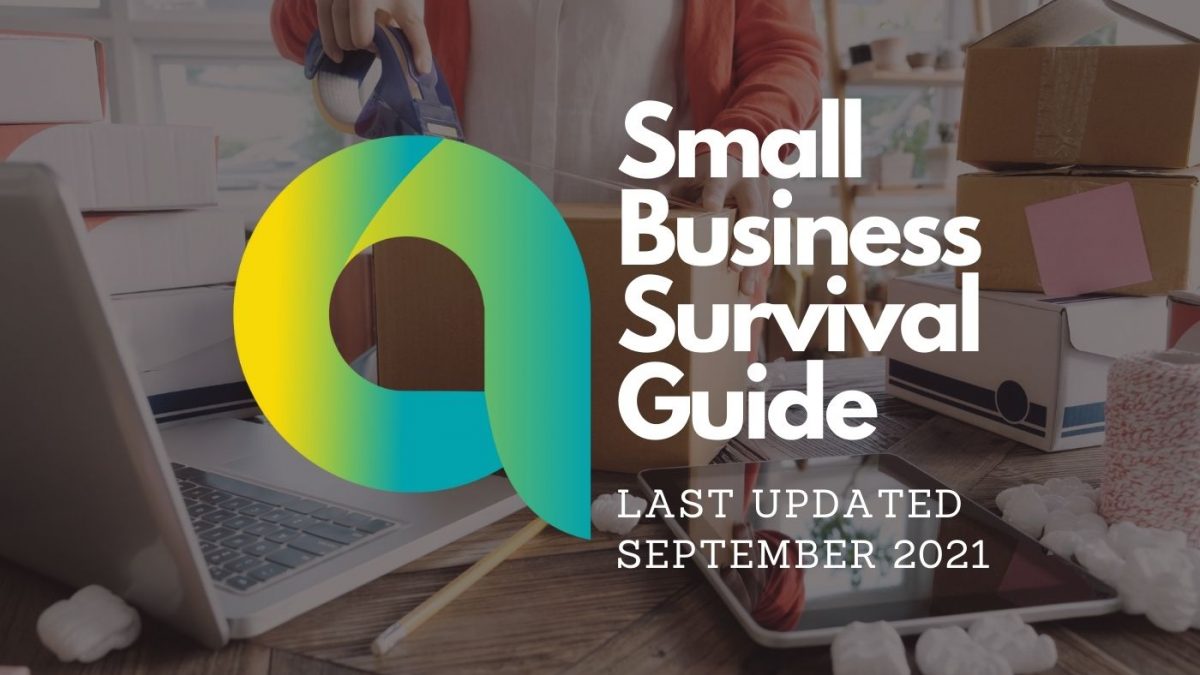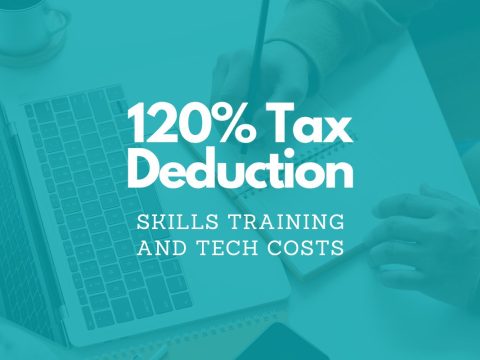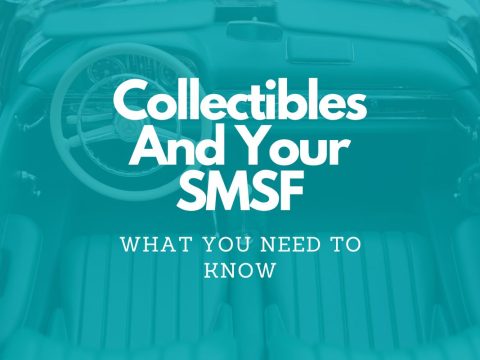2021 Small Business Survival Guide
With the latest round of lockdowns in Australia, many businesses around the country are feeling the continued effects of COVID-19. Many have again been impacted profoundly and are uncertain about what the future holds for them.
We first published a small business survival guide early in 2020, as we all grappled with the many unknowns of running a business during a pandemic. We wanted to revisit some of the most useful tips for your business in 2021 and update you on the various government assistance programs that are currently available. So the 2021 guide was born.
If you own or work in a small business suffering through lockdown, the time to act is right now! There are a number of straightforward, practical steps you can be taking to give you the best chance of survival.
The keys will again be staying on top of your cash flows, minimising expenses, and staying close to your customers and prospects…
Have visibility over your cash situation
If you still aren’t preparing cash flow statements and forecasts, now is definitely the time to invest in getting that done or learn how. You need to know what’s coming up on the horizon and whether you’ll be able to pay every bill.
This will also help you time any important purchases or investments in your business so that you don’t harm your ability to pay other things (e.g. your BAS) later.
The most important reason to do this in the current climate is so that you can make rational decisions specific to your business, in a time where you’ll be hearing a lot that is scary and emotional. Your analysis may reveal your business is in fact fine, and making some of the changes below would be a mistake. Knowing your cash position means you won’t make rash or unnecessary business decisions and keep you from overreacting emotionally after an accidental binge-watch of the news!
Look at finance options
If you do prepare a cash flow statement and are aware of all the important purchases you will be making, you can look at creative cash flow solutions to avoid parting with too much cash upfront. If your car or premises are financed, you can look at refinancing now at lower rates to save significantly on your repayments. If you need to invest in a new piece of equipment, you can look at doing that in a variety of ways to spread out your payments. You can also look at using any unencumbered assets you may have to open up more funding options for you.
It is worth speaking to a professional about your options sooner rather than later. You’re better off making all the necessary changes now to enable borrowing from an established institution at 5% interest rather than a newer, less picky one at the 11th hour at 30%! These figures aren’t exact but you get the point…
Chasing up debtors
Bearing in mind you may need to be understanding and lenient with your customers too, this is not the time to allow your accounts receivable to go unchecked while you “focus on other things.”
Ensure invoices and automated reminders are going out as usual and chase up overdue accounts where you can. Of course, invite customers to engage with you if they’re experiencing any difficulties and be kind. However, don’t simply drop the ball on collections.
This can be organised through apps like ezyCollect and GoCardless, where you can automate payment reminders and collect pre-authorised payments straight away.
Part of not dropping the ball includes considering alternative options such as debtor finance (where an invoice is partly or wholly paid to you by a third party). Depending on the invoice size, time elapsed, the debtor and some other factors, you may have different options available to you. Important to get professional advice on this one.
Negotiate with creditors
If you are renting premises and operate in a heavily affected industry e.g. retail or hospitality, now is the time to start flagging concerns with your landlord and negotiating any possible changes. They may allow you to delay rent payments by a number of months, receive a reduction or at least not continue with a planned increase – it will all make a difference.
Based on your own situation, looking at each of your creditors individually will help you identify any potential savings – which you can then act on quickly (before their own businesses are slow to respond to calls and emails).
Government Support
https://business.gov.au/news/covid-19-business-support-in-your-state
There are a number of COVID-19 grants and assistance that have become available for Australian businesses over the last 18 months, subject to each state. Various governments are providing financial assistance to small businesses experiencing hardship. Below you can find a summary of what your business may be eligible for.
New South Wales
COVID-19 business grant: applications now close at 11:59pm, 1 October 2021
The 2021 COVID-19 business grant provides support for businesses, sole traders or not-for-profit organisations in NSW that have been impacted by the recent COVID-19 restrictions. This funding is to be used for
- Utilities, wages and rent
- Financial, legal or other advice to support business continuity planning
- Marketing and communications activities to develop the business
- The cost of perishable goods that can no longer be used
- Other activities to support the operation of the business.
To be eligible for the grant, businesses must demonstrate that they have been highly impacted by the NSW Government health directions in relation to COVID-19. Highly impacted industries include retail; accommodation and food service; rental, hiring and real estate services; administrative and support services; and arts and recreation services.
Businesses with a turnover that is 30% lower than an equivalent two weeks in 2019 are eligible for this support, whether that be a one-time payment of $7,500, $10,500 or $15,000.
To learn more about whether your business is eligible for the COVID-19 business grant, click here.
COVID-19 micro-business support grant: applications now close at 11:59pm, 18 October 2021
The COVID-19 micro-business support grant will help micro businesses (small business or sole traders with annual turnover of more than $30,000 and under $75,000) impacted by COVID-19 restrictions. You may be able to apply for a $1,500 payment per fortnight of restrictions from late July 2021. To learn more about whether your business is eligible for the micro-business support grant, click here.
JobSaver: applications will close at 11:59pm, 18 October 2021
JobSaver is a support program to maintain employment of staff for small and medium businesses and provide cashflow support to businesses impacted by the current health restrictions.
Employing businesses: 40% of weekly payroll, with a minimum payment of $1,500 per week and a maximum payment of $100,000 per week.
Non-employing businesses: $1,000 per week.
Eligibility:
- A revenue decline of 30% or more.
- Turnover between $75,000 and $250 million.
Applications open late July. To learn more about whether your business is eligible for JobSaver, click here.
Small business fees and charges rebate
If you are a sole trader, the owner of a small business or a not-for-profit organisation in NSW, you may be eligible for a small business fees and charges rebate of $1500. This rebate helps businesses recover from the impacts of COVID-19 and encourages growth by reducing the cost of running a business. Eligible businesses or not-for-profits only need to apply for the rebate once, but can submit multiple claims until the full value of $1500 is reached.
Funds can be used to offset the costs of eligible NSW and local government fees and charges due and paid from 1 March 2021. These include, but are not limited to: food authority licences, liquor licences, tradesperson licences, event fees, outdoor seating fees, and council rates.
To learn more about whether your business is eligible for the small business fees and charges rebate, click here. The rebate will be available until 30 June 2022.
Support for commercial landlords and tenants
New temporary measures that will support commercial tenants and landlords. Protection will be offered for impacted tenants in commercial and retail tenancies in NSW. Landlords with commercial properties may be eligible for a land tax concession if they provide rent reductions to their tenants.
For residential tenancies, following the end of the freeze on evictions till 11 November, a transitional period will run from 12 November 2021 until the end of 12 February 2022. During this time, COVID-19 impacted tenants who accrued arrears during the moratorium period (14 July 2021 and 11 November 2021) are exempt from provisions that would allow them to be evicted for those arrears, with some exceptions.
Click here to learn more about whether you’re eligible for landlord and tenant support.
Jobs Plus program
The Jobs Plus program has now started receiving applications for its plan of action to boost the Australian economy, specifically by expanding business operations in NSW. This program, supported by the NSW Government, is applicable to Australian businesses that employ 20 or more staff, or international companies with at least 80 employees who are looking to start or expand their company in NSW. Your company should have the capability to successfully expand to NSW with the ability to increase in size with at least 30 permanent, ongoing FTE employees before 30 June 2024.
Note: One FTE job is equal to a ‘standard working week’ of 35 hours for ongoing roles. Full time roles can claim 1 FTE and part-time roles can claim a proportion of 1 FTE on a pro-rata basis.
Businesses must apply for Jobs Plus and start hiring new employees before 30 June, 2022. These employees must live and be paid in NSW. Jobs Plus will benefit companies contingent on the number of new jobs created, with a tiered level of support for the companies involved. Benefits include concierge service, payroll tax relief for up to 4 years, subsidised training package rebates, enabling infrastructure rebates, access to subsidised, short-term Government accommodation and spaces, and assistance with planning approvals in NSW.
To learn more about the Jobs Plus program, click here.
To see whether your business is eligible for the Jobs Plus program, click here.
Victoria
For an overview of all assistance available to Victoria, check here. Below we’ve outlined some of the most common payments that you may be eligible for.
Small Business COVID Hardship Fund
The Small Business COVID Hardship Fund will now offer grants of up to $14,000 to small businesses that aren’t eligible for other grant programs and have experienced a 70% reduction in turnover.
The fund is designed to help businesses that are legally allowed to operate but are unable to generate revenue due to restrictions, such as a food outlets located within retail areas. It’s also intended to help businesses that have less customers due to restrictions, such as pharmacists in the CBD or catering businesses. To be eligible, businesses must have experienced a reduction in revenue of at least 70% due to restrictions in place between May and August.
Applications must include evidence of a reduction in revenue of at least 70% for a minimum consecutive two-week period since May 27, when compared to a trading period not affected by restrictions.
Rent relief
In late July the Victorian government reintroduced its Commercial Tenancy Relief Scheme. The scheme is available to businesses with turnover of less than $50 million that have suffered a decline in turnover of at least 30%.
The scheme requires landlords to provide rent relief equivalent to a business’s reduction in turnover, with half of the reduction to be waived and half to be deferred. The rent relief is calculated by comparing a business’ turnover for the final quarter of the 2020/21 financial year with turnover from the final quarter of 2018/19.
To help landlords offer rent relief, the Victorian government is providing land tax relief of up to 25%, in addition to any previous relief. Small landlords who can demonstrate acute financial hardship will be eligible to apply for payments as part of a $20 million hardship fund.
South Australia
Business Support Package
The Business Support Package provides one-off cash payments of $3,000 to eligible businesses affected by the restrictions.
Paying taxes
If the next BAS bill comes along and you are simply not in a position to pay, you can always negotiate payment plans with the ATO. However, given many other finance options (particularly with banks) generally become unavailable with the presence of an unpaid ATO debt, you should be extra careful to prioritise paying tax liabilities (especially if you expect to seek finance).
NSW Government:
- Waiving payroll tax for businesses with payrolls has been extended to 7 October 2021.
Be sure to speak to your accountant to make the most of these measures.
Tightening your belt
Every business has different expenses and ideas on what they should spend on. What are the luxury items you can cut right away?
Every luxury item should be considered first. Before the harder part…
During the first lockdown, Qantas stood down 20,000 out of 30,000 staff after just a few weeks’ strife. Most hospitality venues have slashed their casual pools and even permanent staff. People will understand if your micro or small business simply doesn’t have enough work to go around.
Reducing your workforce is never a nice feeling, but in a downturn it may be a necessary cost-cutting measure. In small businesses, consider all the nuanced options too, like reducing hours or pay (even after an open discussion with staff) rather than making cuts right away. Perhaps two full-timers will agree to become two part-timers temporarily rather than you having to let one go.
Consider all options but, at the end of the day, if staff need to go – you need to be able to do that and justify it (to yourself) with a cash flow forecast showing there was no other way. Where possible, help your staff find new homes by making LinkedIn posts or recommendations praising them, and offer to provide a reference along with anything else you can do.
Staying close to customers and prospects
This too shall pass and, when it does, you don’t want to be rebuilding your client list or sales funnel from scratch. Skype is an amazing tool (just one of many) and there is every opportunity for you to stay in close contact, not just with all your current customers but also with all your sales prospects.
Keep nurturing relationships, keep people informed about your business and keep investing in the people who will buy from you when the situation improves for everybody. To focus on other things and ignore this would be a costly mistake.
Business model innovation
An additional consideration here should be whether any changes to your products/services and pricing (your business model) could enable you to sell to these prospects sooner. For example, if you’re an executive coach and suddenly no-one is able to meet in person, this may be the time to create that wholly online program you have been meaning to get around to. And use free, or less expensive, Zoom sessions as initial meetings to help recruit people into the online course. You’re the expert in your field, so think creatively.
Summary
It’s not all doom and gloom. With federal and state governments and many other organisations all stepping in to offer assistance or leniency, there is a lot of help available to get through this. Make sure you get what you’re entitled to and ask for help when you need it.
Whether it takes another month or longer, this madness will eventually pass and – if your business is to survive – you need to keep a cool head and analyse your own business separately from the broader context. As mentioned earlier, getting ahead of your own cash flow situation will add so much value. Being able to analyse your own business will enable you to make the right decisions for your business – not the broad brush tips professionals (like us) are providing in posts like these. Take these posts (and the news) with a grain of salt and always engage 1:1 with professionals you would like more advice from. The news they have for you may be more reassuring than you expected after all.
As always feel free to contact us if you would like to chat, we’re in business as usual mode – albeit working from home and virtually where possible.
Stay safe and talk soon!
IMPORTANT NOTICE
This document contains general information only. Allworths cannot guarantee the accuracy, completeness or timeliness of the information contained herein. By making this information available to you, we are not providing professional advice or recommendations. Allworths will not be held liable for any loss or damage arising from reliance on this document, including but not limited to any loss of profit, revenue, reputation, or any consequential losses. Before acting on any of the information contained in this document, you should seek professional advice.




